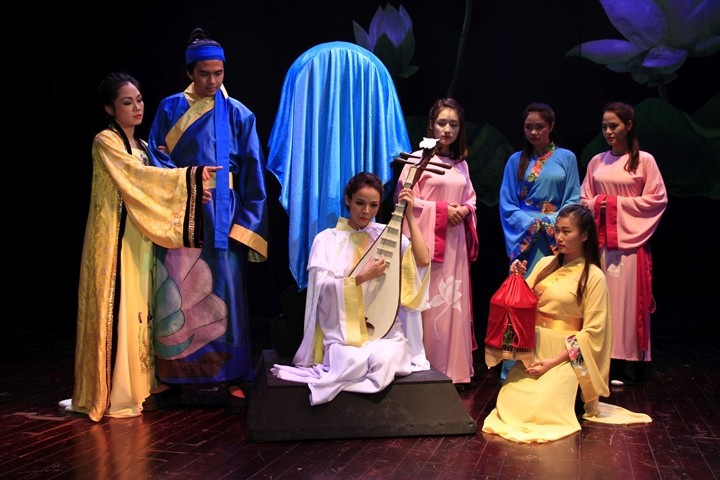(VOVworld) - Truyện Kiều (The Tale of Kieu), a masterpiece written by Vietnamese poet Nguyen Du in the late 18th century, has provided a wealth of inspiration for playwrights. The Vietnam National Drama Theatre’s production of The Tale of Kieu has created a theatrical sensation.
 |
| A scene in the play The Tale of Kieu staged by Vietnam National Drama Theater (Photo: www.nhandan.com.vn) |
The Tale of Kieu has been staged in various traditional art forms: cai luong, (reformed theatre), cheo (popular opera), pantomime, and western-style opera. The Vietnam National Drama Theatre’s adaptation of this literary work combines singing and dancing, creating a new and exciting approach. Ngo Quang Nang, a spectator, said:“I feel happy after watching The Tale of Kieu today. It appears to embody some of the Vietnamese characteristics: humanity and courage. We have a deep culture represented by The Tale of Kieu. Tu Hai, a character in the play, who died in a standing posture, reflects the people’s struggle for freedom against a feudal regime.”
People’s Artist Lan Huong, who plays the wife of a silk seller, has been passionate about this new adaptation of The Tale of Kieu: “Many Vietnamese know The Tale of Kieu, whose characters have become stereotypes: So Khanh (the unfaithful lover), Tu Ba (the procurer), and Hoan Thu (the jealous wife). The director and playwright don’t want the play to simply retell the story, but to convey a certain message.”
The play portrays the beauty of physical appearance and soul: talent, loyalty, heroism, and filial love. The main character, Thuy Kieu, who used to be seen as a symbol of oriental femininity resigned to her fate, is totally different in this new adaptation. Actress Diem Huong said: "Watching our play, the audience will be surprised because the heroine Thuy Kieu no longer accepts her destiny, but struggles to escape from a suffocating society. This Thuy Kieu differs from what people usually imagine.”
Vietnamese culture is reflected in the costume details, dancing, and stage arrangements. The image of a lotus flower implies a human life which opens slightly, blossoms, and withers. Verses, which generations of Vietnamese have memorized, are repeated in the play’s lines and lyrics. Director and People’s Artist Anh Tu said: “This adaptation retains one aspect of the original: a beautiful and talented woman facing numerous miseries. I like Nguyen Du’s The Tale of Kieu because it remains relevant today. When money and illegitimate power are championed, norms and ethics are threatened.”